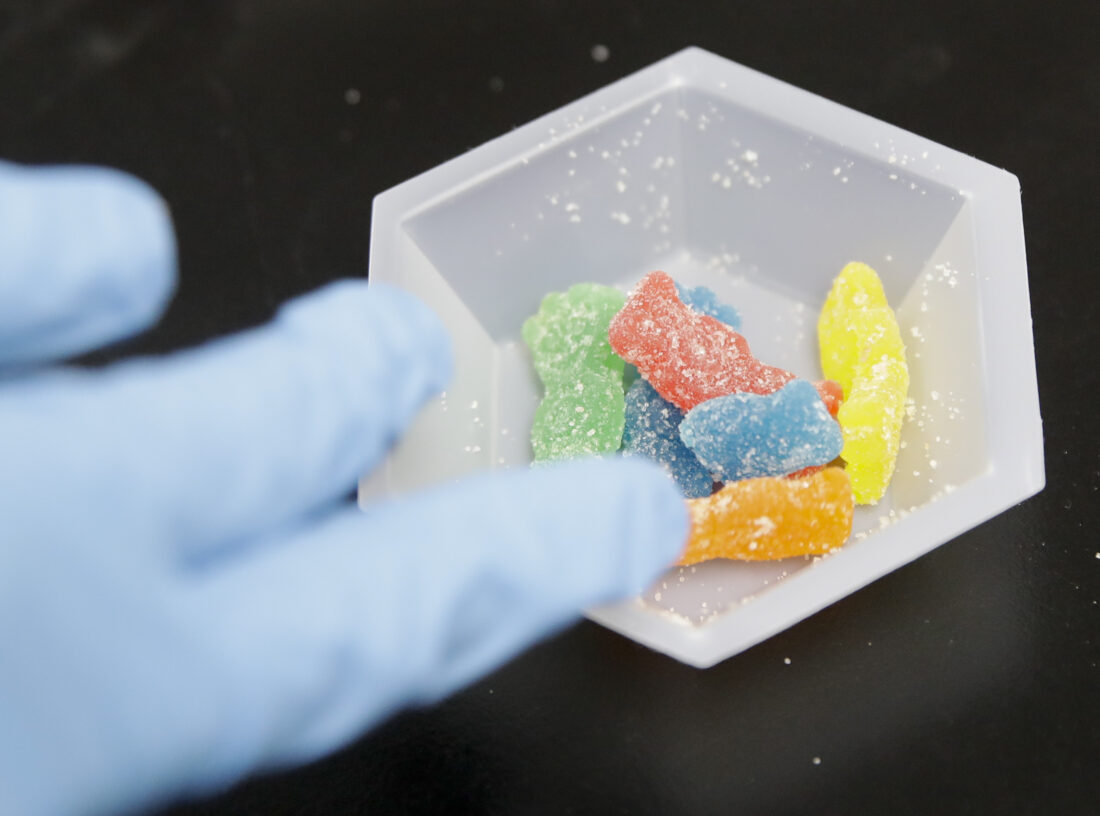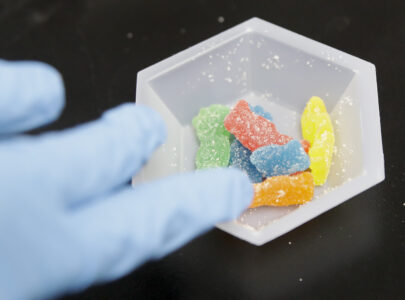Bill Would Ban Sale Or Delivery Of Gummies With THC
- Edible marijuana samples are set aside for evaluation at a cannabis testing laboratory in Santa Ana, Calif.. The number of young kids, especially toddlers, who accidentally ate marijuana-laced treats rose sharply over five years as pot became legal in more places in the U.S., according to an analysis published Tuesday, Jan. 3, 2022, in the journal Pediatrics. AP file photo
- Assemblyman Phil Steck, D-Schenectady, is pictured at the Women’s March for Abortion Justice Rally at West Capitol Park in October.

Edible marijuana samples are set aside for evaluation at a cannabis testing laboratory in Santa Ana, Calif.. The number of young kids, especially toddlers, who accidentally ate marijuana-laced treats rose sharply over five years as pot became legal in more places in the U.S., according to an analysis published Tuesday, Jan. 3, 2022, in the journal Pediatrics. AP file photo
One state lawmaker wants to ban the sale or delivery of candy products containing THC.
Assemblyman Phil Steck, D-Schenectady and chairman of the Assembly Alcoholism and Drug Abuse Committee, has introduced A.4934 to amend the state Cannabis Law. Steck raised concerns about the possibility of people eating too much THC-laced gummies or edibles as more marijuana dispensaries open throughout the state.
“One of the most prominent differences between smoking marijuana and eating edibles is the delayed onset of effects associated with edibles which can take between 30 minutes to 2 hours to experience,” Steck wrote in his legislative justification, “This delay can result in some people consuming a greater than intended amount of drug. The amount of THC in edibles is also difficult to measure and often unknown. Regulations and quality assurance regarding the determination of THC content and product labeling are generally lacking, and as a result the dosage estimation for many edibles is often inaccurate with many products contain significantly more THC than labeled.”
A study released in January in the journal Pediatrics showed there have been more than 7,000 confirmed cases of children younger than 6 eating marijuana edibles were reported to the nation’s poison control centers between 2017 and 2021, climbing from about 200 to more than 3,000 per year. Nearly a quarter of the children wound up hospitalized, some seriously ill. Cases of kids eating pot products such as candies, chocolate and cookies have coincided with more states allowing medical and recreational cannabis use. Currently 37 U.S. states permit use of marijuana for medical purposes and 21 states regulate adult recreational use, according to a Jan. 3 Associated Press report.
Of more than 7,000 reports, researchers were able to track the outcomes of nearly 5,000 cases. They found that nearly 600 kids, or about 8%, were admitted to critical care units, most often with depressed breathing or even coma. Nearly 15% were admitted to non-critical care units and more than a third were seen in emergency rooms. Drowsiness, breathing problems, fast heart rate and vomiting were the most common symptoms.

Assemblyman Phil Steck, D-Schenectady, is pictured at the Women’s March for Abortion Justice Rally at West Capitol Park in October.
“Edibles are often packaged with more than one adult serving,” Steck wrote. “Research has shown that edibles are the form of marijuana consumption most likely to lead to emergency room visits for marijuana overdose, also referred to as acute marijuana intoxication. In addition, accidental marijuana edible consumption among children has been climbing at alarming rates in legalized states and on a national level. Children are at risk for consuming more than the recommended dose for adults because they look just like any other candy or snack.”
Colorado banned the sale of any edibles that look like gummy bears, animals, people and fruit in 2017 in an attempt to make edibles less attractive to children. New Mexico is considering a similar law.
“Prohibiting all candy-like products with THC can help prevent children from the dangers of accidental marijuana consumption and lesson the instances of marijuana overdose,” Steck wrote in his legislative justification. “Recreational cannabis legalization is new to the state, and it is imperative to take the necessary steps to ensure public health and safety.”








